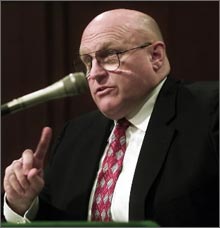Well, today I’m obliged to defer once again. Because, even though few people outside Washington give a damn, tongues are wagging today about the outing of the person who outed CIA agent Valerie Plame. And yesterday, I read the definitive article on this scandal that has had this city in a tizzy for the past 3 years.
If nothing else, perhaps you recall the spectacle of Karl Rove, the architect of President Bush’s presidency, being compelled to testify before a federal grand jury an unprecedented 5 times to escape indictment for allegedly outing Plame. And that, after he failed to indict Rove, the special prosecutor, Patrick J. Fitzgerald, settled for the indictment of I. Lewis “Scooter” Libby, VP Cheney’s chief of staff, which I wrote about here.
 Now comes the stunning revelation that – after years and millions of taxpayer dollars spent investigating this CIA leak (to say nothing of the millions in legal fees people like Rove and Libby (who even lost his job) had to pay) – Richard Armitage, former Secretary of State Colin Powell’s deputy, confessed to being the (unwitting) leaker. Moreover, that he confessed his slip of the tongue not only to Powell but also to (Inspector Javert) Fitzgerald long before he began hauling unsuspecting people before his grand jury.
Now comes the stunning revelation that – after years and millions of taxpayer dollars spent investigating this CIA leak (to say nothing of the millions in legal fees people like Rove and Libby (who even lost his job) had to pay) – Richard Armitage, former Secretary of State Colin Powell’s deputy, confessed to being the (unwitting) leaker. Moreover, that he confessed his slip of the tongue not only to Powell but also to (Inspector Javert) Fitzgerald long before he began hauling unsuspecting people before his grand jury.
Yet, for some inexplicable reason, Powell never told Bush that no one in the White House was behind this leak – even as liberal media flaks and Democrats were accusing him and his administration of all manner of fascistic and Machiavellian conspiracies (to ruin the lives of anyone who questioned the legitimacy of their march to war against Iraq; namely Plame and her (he’s so vain, he probably thinks the war was about him) husband, Joe Wilson….
I promised to defer, didn’t I?
I disclosed here that Charlie Rose is my favorite TV interviewer. Now it is my pleasure to introduce you to my favorite columnist, Christopher Hitchens. For it is he who has written the definitive article which puts this latest Washington farce into proper perspective. (Although, truth be told, his overzealous support for Bush’s war on terror risks alienating my intellectual affection. But I digress…) Here’s Christopher:
 Plame Out
Plame Out
The ridiculous end to the scandal that distracted Washington.
By Christopher Hitchens
Posted Tuesday, Aug. 29, 2006, at 1:02 PM ET
I had a feeling that I might slightly regret the title (“Case Closed“) of my July 25 column on the Niger uranium story. I have now presented thousands of words of evidence and argument to the effect that, yes, the Saddam Hussein regime did send an important Iraqi nuclear diplomat to Niger in early 1999. And I have not so far received any rebuttal from any source on this crucial point of contention. But there was always another layer to the Joseph Wilson fantasy. Easy enough as it was to prove that he had completely missed the West African evidence that was staring him in the face, there remained the charge that his nonreport on a real threat had led to a government-sponsored vendetta against him and his wife, Valerie Plame.
In his July 12 column in the Washington Post, Robert Novak had already partly exposed this paranoid myth by stating plainly that nobody had leaked anything, or outed anyone, to him. On the contrary, it was he who approached sources within the administration and the CIA and not the other way around. But now we have the final word on who did disclose the name and occupation of Valerie Plame, and it turns out to be someone whose opposition to the Bush policy in Iraq has—like Robert Novak’s—long been a byword in Washington. It is particularly satisfying that this admission comes from two of the journalists—Michael Isikoff and David Corn—who did the most to get the story wrong in the first place and the most to keep it going long beyond the span of its natural life.
As most of us have long suspected, the man who told Novak about Valerie Plame was Richard Armitage, Colin Powell’s deputy at the State Department and, with his boss, an assiduous underminer of the president’s war policy. (His and Powell’s—and George Tenet’s—fingerprints are all over Bob Woodward’s “insider” accounts of post-9/11 policy planning, which helps clear up another nonmystery: Woodward’s revelation several months ago that he had known all along about the Wilson-Plame connection and considered it to be no big deal.) The Isikoff-Corn book, which is amusingly titled Hubris, solves this impossible problem of its authors’ original “theory” by restating it in a passive voice:
The disclosures about Armitage, gleaned from interviews with colleagues, friends and lawyers directly involved in the case, underscore one of the ironies of the Plame investigation: that the initial leak, seized on by administration critics as evidence of how far the White House was willing to go to smear an opponent, came from a man who had no apparent intention of harming anyone.
In the stylistic world where disclosures are gleaned and ironies underscored, the nullity of the prose obscures the fact that any irony here is only at the authors’ expense. It was Corn in particular who asserted—in a July 16, 2003, blog post credited with starting the entire distraction—that:
The Wilson smear was a thuggish act. Bush and his crew abused and misused intelligence to make their case for war. Now there is evidence Bushies used classified information and put the nation’s counter-proliferation efforts at risk merely to settle a score. It is a sign that with this gang politics trumps national security.
After you have noted that the Niger uranium connection was in fact based on intelligence that has turned out to be sound, you may also note that this heated moral tone (“thuggish,” “gang”) is now quite absent from the story. It turns out that the person who put Valerie Plame’s identity into circulation was a staunch foe of regime change in Iraq. Oh, that’s all right, then. But you have to laugh at
the way Corn now so neutrally describes his own initial delusion as one that was “seized on by administration critics.”
What does emerge from Hubris is further confirmation of what we knew all along: the extraordinary venom of the interdepartmental rivalry that has characterized this administration. In particular, the bureaucracy at the State Department and the CIA appear to have used the indiscretion of Armitage to revenge themselves on the “neoconservatives” who had been advocating the removal of Saddam Hussein. Armitage identified himself to Colin Powell as Novak’s source before the Fitzgerald inquiry had even been set on foot. The whole thing could—and should—have ended right there. But now read this and rub your eyes: William Howard Taft, the State Department’s lawyer who had been told about Armitage (and who had passed on the name to the Justice Department)
also felt obligated to inform White House counsel Alberto Gonzales. But Powell and his aides feared the White House would then leak that Armitage had been Novak’s source—possibly to embarrass State Department officials who had been unenthusiastic about Bush’s Iraq policy. So Taft told Gonzales the bare minimum: that the State Department had passed some information about the case to Justice. He didn’t mention Armitage. Taft asked if Gonzales wanted to know the details. The president’s lawyer, playing the case by the book, said no, and Taft told him nothing more.
“[P]laying the case by the book” is, to phrase it mildly, not the way in which Isikoff and Corn customarily describe the conduct of the White House. In this instance, however, the evidence allows them no other choice. But there is more than one way in which a case can be played by the book. Under the terms of the appalling and unconstitutional Intelligence Identities Protection Act (see “A Nutty Little Law,” my Slate column of July 26, 2005), the CIA can, in theory, “refer” any mention of itself to the Justice Department to see if the statute—denounced by The Nation and the New York Times when it was passed—has been broken. The bar here is quite high. Perhaps for that reason, Justice sat on the referral for two months after Novak’s original column. But then, rather late in the day, at the end of September 2003, then-CIA Director George Tenet himself sent a letter demanding to know whether the law had been broken.
The answer to that question, as Patrick Fitzgerald has since determined, is “no.” But there were plenty of senior people who had known that all along. And can one imagine anybody with a stronger motive to change the subject from CIA incompetence and to present a widely discredited agency as, instead, a victim, than Tenet himself? The man who kept the knowledge of the Minnesota flight schools to himself and who was facing every kind of investigation and obloquy finally saw a chance to change the subject. If there is any “irony” in the absurd and expensive and pointless brouhaha that followed, it is that he was abetted in this by so many who consider themselves “radical.”
Christopher Hitchens is a columnist for Vanity Fair. His most recent book is Thomas Jefferson: Author of America.
Copyright 2006 Washingtonpost.Newsweek Interactive Co. LLC
Valerie Plame, Richard Armitage, CIA leak case
Paris ib says
There is something of the whore about Christopher Hitchens: he writes what his masters will be most pleased with and sells himself to the highest bidder. Certainly not a man who can be considered objective and well-informed, merely a political mouthpiece for the current regime.
If you are going to defer to someone, try and find someone with at least SOME integrity and credibility.
ALH ipinions says
paris ib
You seem to know Mr Hitchens in the biblical way….But I’m too much of a gentleman to comment on why he incites in you such an embittered and cold tone.
However, apropos deference, I defer to my readers to assess the integrity and credibility of my columns and comments thereto. But after leaving a comment to an article you posted on your fxTalks blog on Tuesday, August 22, 2006, which has yet to appear, am I to assume that you are too timorous to defer to your readers in this manner?
Nonetheless, thank you for your comments. I assure you that I shall welcome them always, without moderation.
Paris ib says
Anthony your pompous tone really detracts from anything useful you might have to say.
Being a whore means being for sale, sex in this case has nothing to do with it.
Comments I don’t find relevant I don’t post. That’s my editorial choice.
ALH ipinions says
Thank you for the clarification paris ib.
I suppose that explains why there are no comments posted to hardly any of your columns. What a discriminating editor you are….
Paris ib says
Grow up Anthony.